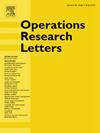弦图上 DSatur 算法的最优性
IF 0.9
4区 管理学
Q4 OPERATIONS RESEARCH & MANAGEMENT SCIENCE
引用次数: 0
摘要
DSatur 是一种广泛使用的图着色启发式算法,由 Daniel Brélaz 于 1979 年提出。它基于贪婪着色法,但要从那些能最大化其邻居已用颜色数的顶点中选择下一个着色顶点。虽然这种算法并不总是最优的,但已知它在某些族上是最优的,比如循环图或双叉图。在本文中,我们将证明 DSatur 在和弦图(一种超类的区间图)上的最优性。本文章由计算机程序翻译,如有差异,请以英文原文为准。
Optimality of DSatur algorithm on chordal graphs
DSatur is a widely-used heuristic algorithm for graph coloring, proposed by Daniel Brélaz in 1979. It is based on the greedy coloring approach, but selecting the next vertex to be colored from those that maximize the number of colors already used by their neighbors. Though not always optimal, this algorithm is known to be optimal on certain families, like cycles or bipartite graphs. In this paper, we prove the optimality of DSatur on chordal graphs, a superclass of interval graphs.
求助全文
通过发布文献求助,成功后即可免费获取论文全文。
去求助
来源期刊

Operations Research Letters
管理科学-运筹学与管理科学
CiteScore
2.10
自引率
9.10%
发文量
111
审稿时长
83 days
期刊介绍:
Operations Research Letters is committed to the rapid review and fast publication of short articles on all aspects of operations research and analytics. Apart from a limitation to eight journal pages, quality, originality, relevance and clarity are the only criteria for selecting the papers to be published. ORL covers the broad field of optimization, stochastic models and game theory. Specific areas of interest include networks, routing, location, queueing, scheduling, inventory, reliability, and financial engineering. We wish to explore interfaces with other fields such as life sciences and health care, artificial intelligence and machine learning, energy distribution, and computational social sciences and humanities. Our traditional strength is in methodology, including theory, modelling, algorithms and computational studies. We also welcome novel applications and concise literature reviews.
 求助内容:
求助内容: 应助结果提醒方式:
应助结果提醒方式:


